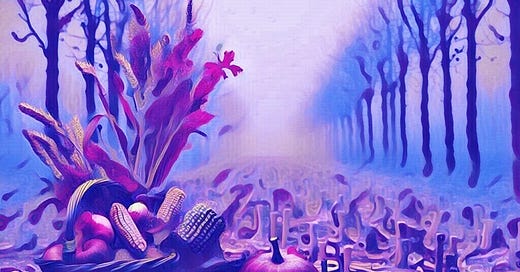
It’s almost Thanksgiving, so here’s an audio post about the American holiday’s real origin and our ability to use social media to debunk myths and add additional context to widely accepted narratives. Transcript below for those who prefer to read instead of listen.
[TRANSCRIPT]
There is a tremendous difference between celebrating a holiday that honors universal concepts of gratitude and unity and one that honors a single, problematic historical event. The stories we tell and the voices and perspectives we amplify on social media matter.
Hi everyone. Welcome to Digital Hope Talk. I’m Lauren Hug and I thank you for listening and being willing to explore better ways of navigating our digital world together.
This is Episode 8 — Celebrating Gratitude, Not History.
When I was little, I didn’t care much about Thanksgiving one way or another. My family didn’t do the “traditional” turkey and stuffing thing all that often. We ate everything from spaghetti to chicken cordon bleu to a highly memorable (and not particularly edible) turducken one year. Nor did we often celebrate with extended family or friends. Those visits happened around Christmas, a holiday my family – and my mom in particular -- was way more into.
In my childhood, Thanksgiving primarily had significance as the day (or the day before) the Christmas tree and boxes upon boxes of nativity scenes, stockings, candy canes, Santas, snowmen and other decorations made their way from their attic and flooded our home. (My brother often referred to it as “the house that puked Christmas.”)
Most of my understanding of the cultural significance of Thanksgiving came from school. I was taught that the “Indians” helped the Pilgrims by sharing food and the Pilgrims gave thanks to God for new friendships and surviving a harsh winter. Or something like that.
Sometime around third or fourth grade, my class “re-enacted” the “first” Thanksgiving feast with the Pilgrims and the “Indians.” I don’t recall how the teacher decided which students were Pilgrims and which were “Indians,” but I got stuck being a Pilgrim with a boring white bonnet and ruffle collar. I remember thinking the “Indians” had much cooler accessories. They got to wear headbands with colorful construction paper feathers and brightly colored macaroni necklaces standing in for beads. (I didn’t know anything about cultural appropriation then; one of the many things I’ve learned about via social media.)
As an adult, Thanksgiving became my favorite holiday. To me, it was the perfect combination of food, family, friends, and gratitude, not affiliated with any particular religion and with no gift requirements.1 Over the past few years, however, social media introduced me to voices and perspectives of indigenous people – voices I never heard through school or traditional media – that led me to question my love of a holiday purportedly celebrating friendly relations between indigenous people and colonists.
I’m thankful for social media posts (like this one from the Albuquerque chapter of Standing Up for Racial Justice addressing settler colonialism and Thanksgiving/”Things-Taking”) that require reconsideration of stories I’ve been told all my life and compel me to seek deeper and more accurate understanding of history. I am far more aware now of the atrocities committed against native peoples by colonists and the formal government of the United States – and the ongoing impact these atrocities continue to have.
Civilizations, people groups, and ways of life have been eradicated, erased, exploited, and maligned. How different would the world be if these voices had not been silenced or marginalized? How many answers to the challenges we now face can be found in the wisdom of those who have been barred from discourse and seats of power?
In the case of Thanksgiving, however, the story many of us have been told about the origin of the holiday is complete fabrication. While researching Digital Grace, I came across a book called We Gather Together: A Nation Divided, a President in Turmoil, and a Historic Campaign to Embrace Gratitude and Grace by Denise Kiernan. I had no idea what it was about, but checked it out from the library because it had “grace” in the subtitle. Turns out, it is a meticulously researched recounting of how the national Thanksgiving holiday in America came to be.
I highly recommend reading this book for a comprehensive look at how the commonly accepted “facts” about Thanksgiving aren’t facts at all -- not because of the depiction of relations between colonists and indigenous people, but because the “first” national Thanksgiving had absolutely nothing to do with any of that. It was the result of one woman’s decades-long petitioning for a national day of thanksgiving and President Lincoln’s call for a splintered nation to unify in gratitude for one day in the midst of the Civil War.
Kiernan writes:
“The interesting thing about the thanksgiving story Americans grew up hearing is that in all of Sarah Josepha Hale’s latter to the presidents – including the one sent to Lincoln—not once did she mention the Pilgrims or 1621 … And not once did Lincoln, in his proclamations, replete with sincere intentions and humble prose, with their calls for gratitude, make a single reference to the Pilgrims or the Puritans or the 1621 event or any events occurring in Plymouth…. [N]either [Hale] nor Lincoln—nor any other presidential proclamation following in their footsteps—sought to commemorate a specific event that occurred in New England, or to modify the story of how or what was eaten.”
According to Kiernan, the story most of us know grew from “embellishments” in newspapers and magazines that “coincided with growing anti-immigrant sentiment in the later nineteenth century and an aggrandizement of Anglo-Saxon heritage.” Those embellishments eventually transformed an inclusive holiday that, in Kiernan’s words, “looked to bounties in the midst of scarcity, those that found grace in the midst of strife, those that acknowledged loss yet embraced what few and fleeting gains there appeared to be” into one that honors only one group of people while minimizing the harm that group inflicted upon others.
The stories we tell and the voices and perspectives we amplify on social media matter. There is a tremendous difference between celebrating a holiday that honors universal concepts of gratitude and unity and one that honors a single, problematic historical event.
We need to debunk myths, bring uncomfortable facts into the light, and grapple with the complexities of multiple perspectives. We have to be willing to explore the full and multi-faceted truth about what came before to understand why we’re here, where we’re headed, and how to build something better for all.
Happy thanksgiving —little ‘t’—to you all. Thank you for being part of my digital community!













Share this post